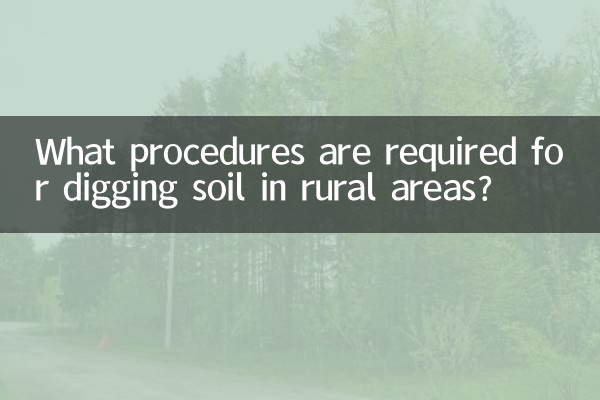What procedures are required for digging soil in rural areas?
In recent years, with the acceleration of rural infrastructure construction and agricultural development, earth excavation operations have become more and more common in rural areas. Whether it is building roads, excavating fish ponds, or conducting land consolidation, excavation requires compliance with relevant laws and regulations and necessary procedures. This article will introduce in detail the procedures and precautions required for excavation in rural areas, and help farmers conduct excavation operations legally and compliantly.
1. Laws and regulations you need to know before digging

When conducting excavation operations in rural areas, you first need to understand relevant laws and regulations such as the Land Management Law of the People's Republic of China and the Soil and Water Conservation Law of the People's Republic of China. These laws clearly define land use rights, approval processes for excavation, and environmental protection requirements. Excavation without permission may result in fines or even criminal liability.
2. Main procedures for excavation in rural areas
The following are the main procedures and related requirements required for rural excavation:
| Procedure name | Handling department | Materials required | Things to note |
|---|---|---|---|
| Proof of land ownership | Village committee or township government | Land contract contract, copy of ID card | Ensure land ownership is clear and avoid disputes |
| Application for excavation approval | Township land and resources office | Application form, land use plan | The purpose and scope of excavation need to be explained |
| environmental impact assessment | environmental protection department | Environmental impact assessment report, excavation plan | Large-scale excavation projects require special environmental assessment |
| soil and water conservation plan | water conservancy department | Soil and Water Conservation Plan | Prevent soil erosion caused by digging |
| Safety production license | Safety supervision department | Safety production plan, equipment list | Ensure safety during excavation operations |
3. Precautions after digging
After the excavation work is completed, the following obligations still need to be fulfilled:
1.land reclamation: According to the "Land Reclamation Regulations", the excavated land needs to be reclaimed to restore its agricultural or ecological functions.
2.environmental protection: The waste soil and waste rocks generated during the excavation process must be properly disposed of to avoid environmental pollution.
3.security check: Warning signs need to be set up in the excavation area to prevent safety accidents.
4. Frequently Asked Questions
Q: Do I need approval for excavation of my own homestead?
A: If it is a small-scale excavation (such as building a septic tank), approval is usually not required, but you need to ensure that it does not affect neighbors and public facilities. Large-scale excavation still requires relevant procedures.
Q: How long does it take for excavation approval?
A: It generally takes 15-30 working days. The specific time depends on the approval process of the local department and the complexity of the project.
5. Summary
Although excavation is common in rural areas, the procedures cannot be ignored. Legal and compliant excavation operations can not only avoid legal risks, but also protect the environment and land resources. Farmers are advised to consult local authorities before digging to ensure complete procedures and safe operations.
Through the above content, I believe everyone has a clearer understanding of the procedures for excavation in rural areas. If you need further assistance, you can contact the local land and resources department or village committee.

check the details

check the details